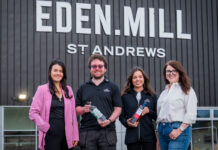Scottish drinks producers taking huge strides to cut carbon footprints

WHETHER a founding principle of a relatively new business or a growing focus for a more established player, sustainability is an increasingly important consideration for Scotland’s drinks industry.
From distilleries with little or no carbon footprint to breweries taking steps to cut emissions to wholesalers implementing ‘greener’ delivery strategies – producers and distributors are doing what they can to minimise their impact on the environment.
For Niall Macalister Hall, who co-founded Kintyre Gin producer Beinn an Tuirc Distillers at Torrisdale Castle Estate in 2016, sustainability has underpinned the business since its inception.
“We are committed to leaving a legacy of replenishment and our brand image as a sustainable and ethical company is as important to us as bottle sales,” he said.
“For us, this not only includes working practices, but also community sustainability. We believe our approach sets us apart from others within the Scottish gin industry as we recognise the responsibility we have towards our unique corner of Scotland and the local community as a whole.
“We utilise our own on-site hydro electric scheme to power our distillery and office; we plant trees on an area of land on the estate to off-set against carbon; we utilise an old Victorian spring supply which is more than sufficient for our needs. By utilising our own clean, green energy, we save approximately 10,100 kg of carbon dioxide per annum.
“In addition to this we are currently undertaking a study with an environmental consultant to accurately calculate our whole carbon footprint. The early indications are that this will be a positive footprint, in that our activity goes beyond being carbon neutral and that we are positively contributing to the environment.
“This study is due to be completed in late 2020 and if it is as expected, we will be the first gin distillery of our kind we believe. This will also provide us with a benchmark from which to work in future years.”
Sustainability was also a founding principle of Nc’nean Distillery on the Morvern peninsula on the west coast.
Annabel Thomas, who established Nc’nean, which takes its name from Neachneohain – the queen of the spirits in Gaelic legend, in 2013 and began production in 2017, said: “We source organic barley, we use 100% renewable energy, we recycle our cooling water and we recycle or reuse 99.97% of our waste,” she said.
“But it is a constant evolution and we are constantly identifying and looking to improve what we do. As an example, we are just in the process of launching our first whisky and we have sourced a 100% recycled clear glass bottle. This is a first in spirits and reduces the carbon impact of each bottle by 40%. Outer cases are made from recycled material too. We are also launching a ‘non-gift box’ SKU for our whisky.
“Having said all of that, none of it is ‘easy’. In general these factors either complicate or cost more to the business than the less sustainable solutions, which is frustrating but we believe it is our responsibility to seek out the most sustainable route.
“Our biggest goal is to become carbon neutral within a few years, if not less.”
Carbon neutral status is also on the agenda for Eden Mill.
Our image as a sustainable and ethical company is as important to us as bottle sales.
The company is set to open a carbon neutral distillery at the University of St Andrews’ Eden Campus at Guardbridge at the end of this year. Power and heat for the stills will be supplied by the university’s biomass plant and solar panels on the distillery’s roof.
The new facility is part of a wider commitment by Eden Mill to cut its carbon footprint – a strategy which saw it introduce a new glass bottle for its Love Gin earlier this year.
“Moving away from our classic ceramic bottles was a big step for Eden Mill, but was taken to ensure the sustainable future of Eden Mill,” said head of sales Matthew Miller.
“Our new lightweight bottles are made using 18% less glass than an industry standard glass bottle so there is less waste to begin with.
“This lightweight design also makes it easier for bartenders to use and to measure during stock takes. This bottle was also created and made in the UK to ensure a low carbon footprint from the beginning.
“Eden Mill believes that customers are growing ever more concerned with the environmental impact of their purchases. We believe that if an on-trade venue has a more sustainable presence then customers are more likely to return to these venues.”
Of course it’s not just Scotland’s distilleries that are going the extra mile to cut their carbon footprints.
Brewers across the country are adopting more sustainable practices across each element of the production process.
BrewDog is set to plant a million trees north of Loch Lomond to create a new BrewDog forest as part of a major sustainability push by the ‘carbon negative’ brewer (see page 38).
And Tennent’s is ramping up its sustainability efforts, with a number of new initiatives.
Following the installation of an anaerobic digestion plant at Wellpark Brewery in Glasgow late last year, which allows it to treat wastewater on-site whilst simultaneously generating bio-gas which can be used to heat the brewery, Tennent’s added a new carbon capture facility to Wellpark in July of this year, which it said will allow it to capture over 4200 tonnes of CO2 each year.
“The facility, the largest of its kind in Scotland, will repurpose CO2 from the fermentation process meaning it can be reused in future brewing and make the site over 95% self-sufficient in our CO2 requirements,” said Martin Doogan, group engineering manager at Tennent’s parent company C&C Group.
“Our aim is to be net carbon zero by 2025. Tennent’s has also committed to be sourcing all energy from renewable sources by 2025.
“In May this year Tennent’s announced that it will open a new 50,000 square foot warehouse and distribution centre at Newbridge. This facility (scheduled to open this month) will significantly enhance the wholesaler’s service to customers especially in the east of Scotland. The new depot in Edinburgh also fits with Tennent’s environmental agenda by reducing product miles travelled and CO2 emissions.”
Sustainability is also an ongoing focus for Perthshire-based water producer Highland Spring, which, last year, launched its eco-bottle made from 100% recycled and recyclable plastic .
Nichola Grant, channel marketing manager at Highland Spring Group, said: “Environmental sustainability will continue to underpin everything we do in 2021.
“We will be increasing the number of products available in recycled plastic (rPET) and will continue to focus on ultimately reaching 100% rPET across all Highland Spring products as the quality and quantity we need becomes available, with a target of 50% recycled content in our bottles by 2022.”























